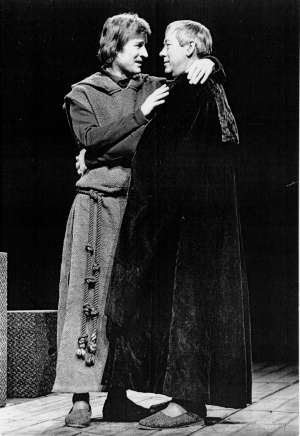NEW FLAVOUR FOR
"FAUSTUS"
|
It was not the best of beginnings. A
distinguished audience stood for the National Anthem to open the Royal
Shakespeare Company's season at the Abbey last night, and the ghostly orchestra
had its score spirited away by Dr. Faustus himself, the Conjuror Laureate. The
bleak Theatregoround set made one long for one big beautiful prop such as
Hilton Edwards would have given it, and the severely uniformed cast looked
chilly and unhappy and far away from home.
But that was only to begin with. Directed with
wit and marvellous flexibility by Gareth Morgan, they went on to give us an
evening quite different in style and flavour from any Dr. Faustus I have
seen - three in all. It was not that Morgan did not take his Marlowe seriously,
or that the mighty line was ignored.
On the contrary, nobody could have the
slightest doubt that this was a parable about the fall of man brought about by
intellectual and sensual arrogance, or that Marlowe at 29 had foreshadowed the
entire subsequent flowering of Elizabethan blank verse as surely as his Jew of
Malta had been the father of Shylock.
What made this production different was
Morgan's humorous tongue-in-cheek approach to the spectacular element in the
play, for instance in the famous parade of the Seven Deadly Sins, and in the
scene at the Vatican. |

|
The grotesque masks and the Mardi Gras sheer high
spirits did more than provide a touch of carnival. Particularly in the Vatican
scene, they gave an impudent contemporary touch that kept the audience laughing
at two levels all the time.
The incredibly hard-working cast - most of whom
played five or six different parts - gave a splendid show of teamwork. At first
David Waller's Faustus showed no clear indication that his voice would be equal
to the "face which launched a thousand ships" and other mighty lines, but in
fact it rose well to every demand made on it.
He is an actor of stature and intelligence, but for
me he was just barely overbalanced by Alan Howard (Mephistophilis) whose
sinister flutelike voice suggested more depth of evil than all the Seven Deadly
Sins put together. He moved like a dancer and his sense of timing was nothing
short of diabolical. Terence Taplin (Chorus) held the whole character of the
play securely in his grasp.
Altogether an excellent evening's theatre, not to be
missed in view of the famine of classical drama from which Dublin has suffered
for so long.
Val Mulkerns
Irish Press, 11.3.1970.
EXCELLENT PRODUCTION OF "DR.
FAUSTUS"
The myth of Faust, the man who sold his soul to the
devil is one that has fascinated man for hundreds of years. In the Royal
Shakespeare Company's production of Dr. Faustus by Christopher Marlowe,
which opened in the Abbey Theatre, Dublin last night, it is given a new
relevance to modern life.
Under the direction of Gareth Morgan, Dr.
Faustus becomes more an exploration of the subconscious and less of a
cautionary tale. A subtle shift of emphasis makes it portray not a
power-hungry, evil man in search of supernatural powers, but the terrifying
world of a consciousness in breakdown. Thus, all Faustus' devils are faceless,
they all lurk behind nightmare masks - all the manifestations of evil are
equally anonymous and fantastic - they do not have faces because they are not
real, they exist only in the soul thrown into chaos by the realisation of
mortality and the limitation of its own knowledge. Even Marlowe's broad comedy
is fantasised into a burlesque which, while it is wildly funny, adds even more
menace to the sinister atmosphere of irrationality.
Twelve people play 49 parts between them in this
production and with such success that it seems almost unfair to single anyone
out for particular praise, but this must be done in the case of the two
principals, David Waller who played Faustus, and Alan Howard who played
Mephistophilis. Waller gave a superb portrayal of a man thrown into interior
chaos - even to the high pitch of his voice in moments of pride or desperation
or in the short reckless laughter he affects when he realises that he has sold
his soul. He achieved a fine characterisation and the last minutes of the play
were as characteristic as a traditional Elizabethan drama should be.
Praise is superfluous for Alan Howard. He gave the
impression of being possessed by the spirit of Mephistophilis completely. He
was quite schizophrenic, at once the completely attractive and alluring rascal
and the debased angel, full of self-hatred and disgust for the task he has been
set. Even when the part called for the burlesque scene where custard pies fly
as fast as in any Marx Brothers film, Howard managed to give his part this
double-edged interpretation.
The design for the play was created by his wife,
Stephanie Howard, and it was quite inspired. Simple, almost stark, the set
consisted of a black-hung stage, on which a round platform, tilted forward,
held several boxes of varying sizes which were used to suggest whatever was
needed in the way of props. The costuming was equally simple, and equally
effective. Black suits with knee-breeches were draped with cloaks or other
garments as the play demanded.
The play is to run for two weeks in Dublin before
continuing on its English tour. The only pity is that so many Irish theatre
lovers will not have a chance to see it.
N.B.
Cork Examiner, 11.3.1970.
